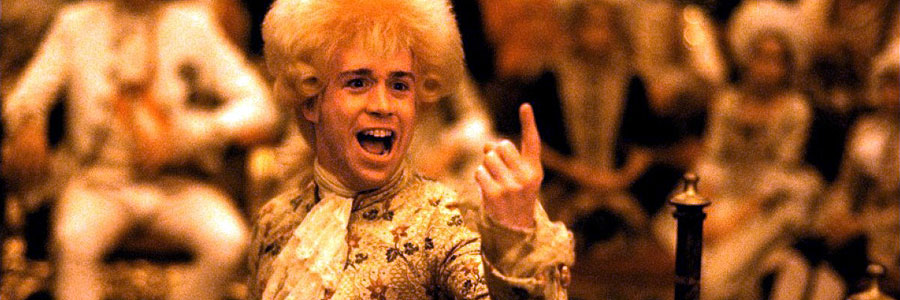
Amadeus

AMADEUS (MOVIE)
Orion Pictures
Original release: September 19th, 1984
Running time: 161 minutes
Director: Miloš Forman
Writers: Peter Shaffer
Cast: Tom Hulce, Elizabeth Berridge, Simon Callow

A wintery night in Vienna and the old court composer, Antonio Salieri cuts his throat. Having survived the attempt to take his own life, Salieri is taken to the asylum where he’s visited by a pasty young priest who wishes to offer solace to a soul in pain. And so Salieri begins to unburden himself. What follows is part-biopic, part-conspiracy theory, a murder mystery, but also a meditation on the morality or otherwise of talent, the tragedy of mediocrity. It’s a tragic-comedy of startling power.
Salieri tells of his own rise to prominence in Vienna due—in part—to the fortuitous death of his father, who chokes on a fish bone. The importance of getting rid of your father figure and the blackly humorous admission of fortune will haunt the film. Although Mozart already has fame as a prodigy, Salieri first meets him as a young man performing for his patron, the Archbishop of Salzburg. Mozart, played in a performance of career destroying brilliance by Tom Hulce, is a boyish genius with a potty mouth, an obvious impetuous disregard for authority and playing the courtly game, a vulgar sense of humour and a ridiculous hyena laugh. Salieri is cursed by the inability to produce anything that compares to Mozart and soon comes to hate the ‘filthy little creature’ even as he cannot help adore and worship each of his compositions.
Mozart tactlessly reveals, for his part, his lack of interest in Salieri’s compositions, telling him ‘I once did a variation on one of your themes, a funny little tune but it yielded some interesting things.’
From that moment on, Salieri deviously sabotages Mozart’s career, obstructing him from being appointed by the enlightened Emperor Joseph II as a tutor to his niece, spreading rumours and eventually spying on him and (it is suggested rather than shown) poisoning him. Mozart himself is a self-destructive character, unwilling to fit in to the world of patronage and strict social hierarchy of Viennese society, where court musicians were first and foremost servants. The real Mozart complained in a letter that he was seated below the valets and close to the cooks while dining in a patron’s house. He’s also profligate with his money, a hard drinker, a debtor, a man who has married in haste to Constanz (Elizabeth Berridge), the daughter of his landlady and a seriously compromised relationship with his father, Leopold, the man who made him but refuses to let him go. And yet in the midst of all this, he manages to produce some of the most sublime music ever created by human hand.

Milos Foreman is brilliant at capturing the period: the wig makers, the parties, the loitering servants, the toadies at court, the gravediggers. And the two brilliant central performances are complemented by a magnificent ensemble, the highlight of which has to be Jeffrey Jones’ comic masterpiece, the Emperor Joseph II, whose obvious love for music is trammelled by his perfunctory officiousness: ‘There it is.’ Berridge is also wonderful as Mozart’s wife, a girl who genuinely loves her husband but gradually loses him to drink and depression. Simon Callow also channels his hero Orson Welles to play an impresario intent on bringing Mozart’s music to the common people.
Of course the real star of the film is the music and it’s during the scenes when the music takes the centre stage that the film becomes truly sublime. Salieri’s descriptions of Mozart’s music are eloquent and heartfelt. We hear the music—even the very familiar pieces—anew through Salieri’s psychological interpretations. Schaffer’s language is a fitting accompaniment to his subject matter and Milos Foreman’s staging of the operas in particular is dramatic and powerful. The set piece which crowns this is the composition of the Requiem which seems to do the impossible in making the act of creation visible and audible, and exciting: ‘Have you got it?’—‘You go too fast, you go too fast’.
With Mozart on his death bed, we and Salieri for the first time are gifted with the insight of seeing Mozart at work. And even an enfeebled Mozart, croaking the chorus out, is a wonder to behold.
On its release Amadeus was a commercial and critical success. It won Oscars though it courted some controversy in its endorsing of the tired legend of Salieri’s poisoning of Mozart, which is about as credible as Francis Bacon’s authoring of Shakespeare’s plays. Since then, it has somewhat dropped out of the critical discourse, but it’s a film that almost uniquely makes you feel both the power of music and the nuts and bolts and often the price and sacrifice of its creation.

John Bleasdale
John Bleasdale is a writer based in Italy. He has published on films at various internet sites and his writing can be found, along with blog posts, collected at johnbleasdale.com.
He has also contributed chapters to the American Hollywood and American Independent volumes of the World Directory of Cinema: (Intellect), Terrence Malick: Films and Philosophy (Continuum) and World Film Locations: Venice (Intellect). You can also follow him on Twitter @drjonty.
© 2022 STATIC MASS EMPORIUM . All Rights Reserved. Powered by METATEMPUS | creative.timeless.personal. | DISCLAIMER, TERMS & CONDITIONS
HOME | ABOUT | CONTACT | TWITTER | GOOGLE+ | FACEBOOK | TUMBLR | YOUTUBE | RSS FEED
CINEMA REVIEWS | BLU-RAY & DVD | THE EMPORIUM | DOCUMENTARIES | WORLD CINEMA | CULT MOVIES | INDIAN CINEMA | EARLY CINEMA
MOVIE CLASSICS | DECONSTRUCTING CINEMA | SOUNDTRACKS | INTERVIEWS | THE DIRECTOR’S CHAIR | JAPANESE CINEMA





